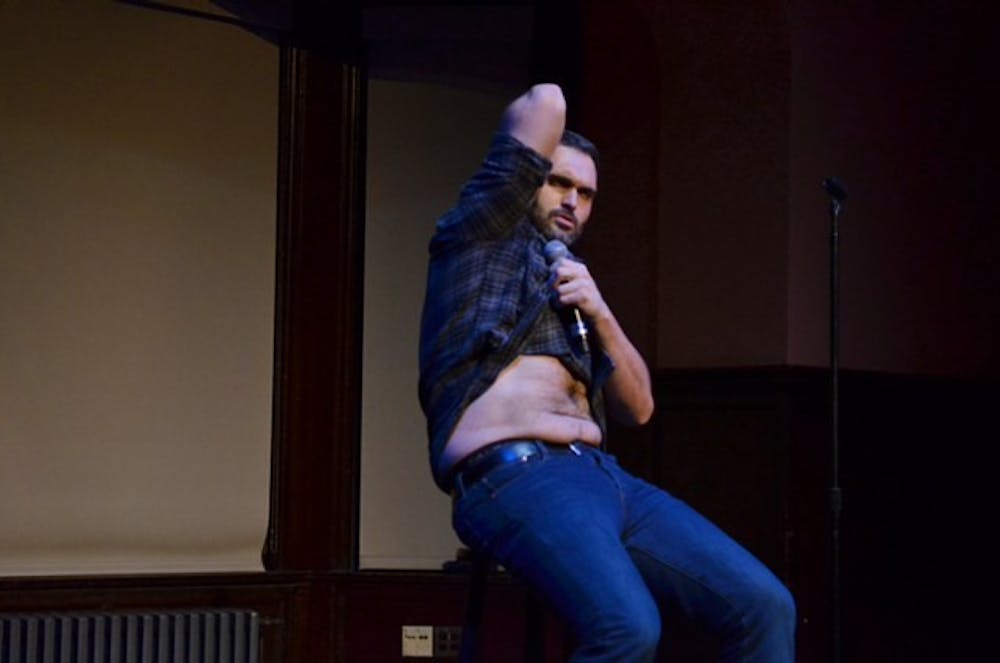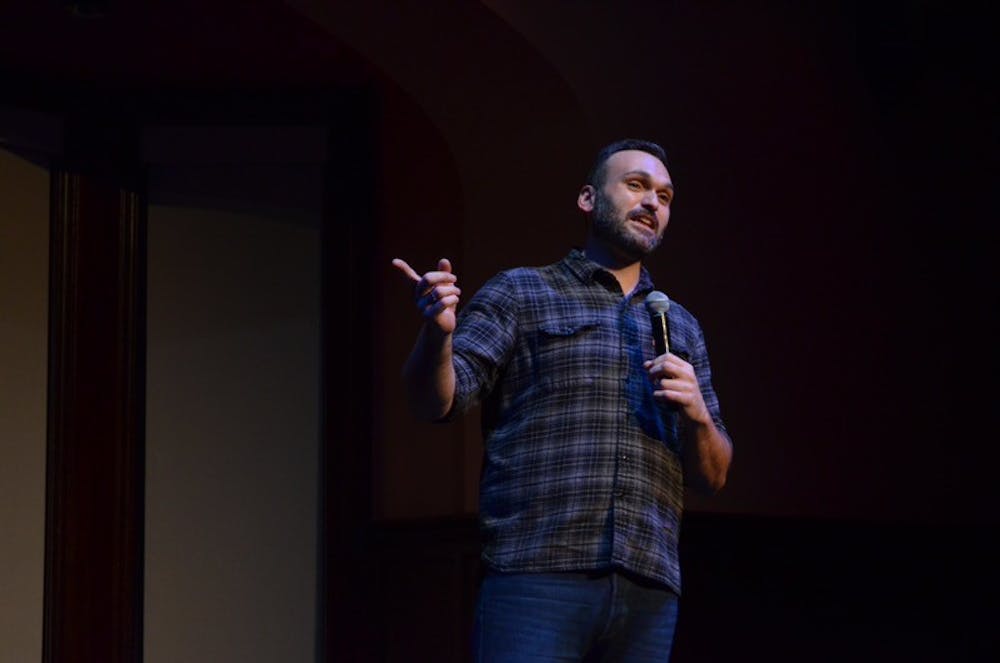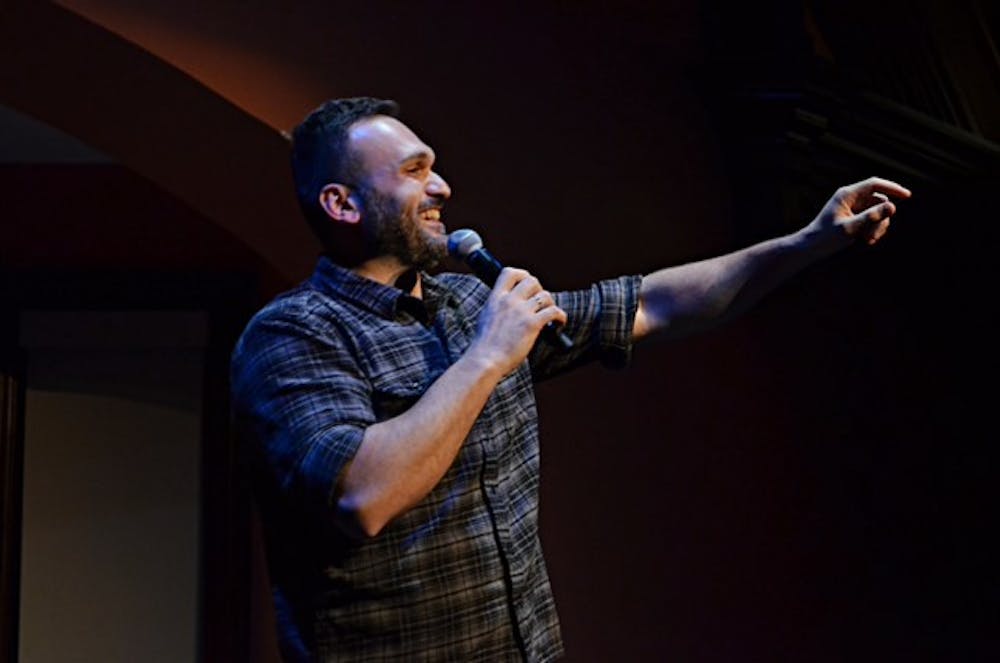It’s no wonder that Penn’s Lebanese Club’s most significant event this year was a night spent with one of the most significant comedians from Lebanon: Nemr Abou–Nassar. A cultural leader in the region, Nemr’s honest and outspoken humor connects people from all over the world.
In a world so heavily divided, humor is a requirement for life to maintain its cheer. That’s where Nemr steps in: to speak about topics people are uncomfortable discussing, shine a light on the problems our world faces, and call audience members to action—in hopes people will alter the way they view disparate people and cultures. Last Tuesday, he brought his world–touring talents to Penn’s small stage in Houston Hall.
A stark neon blue light illuminates Nemr’s robust figure as he animatedly paces across the stage in Nike Air Force Ones, his hands wavering with conviction. Nemr skips from joke to joke without missing a beat—except when he can’t hold in his motorcycle–like chuckle. He starts in a flash, pointing to members of the audience and asking where they’re from. Egypt, Jordan, Morocco, Saudi Arabia, Palestine, Syria, America—the audience has come from all over. Nemr seamlessly goes through each audience member's name, providing phonetic definitions for each.

“If you ask someone in the Middle East their first and then their last name, you know the entire history of their family,” Nemr jokes, “[American] names carry no expectation.” He points to one of the only Americans in the crowd, “Her name is Connor, she can be anything!” The audience roars as he jumps into his new acclaimed show, Love Isn’t the Answer.
As a Lebanese–American who grew up half in San Diego and half in Lebanon, Nemr has kept one foot in each world, providing him with a unique perspective. When it comes to America’s attitude towards politics and everyday life, Nemr says thoughtfully, “America has two emotional states, zero to one hundred ... we either don’t care or lose our shit.” America’s unrest, Nemr believes, is not because of the political climate, but because “America is angry and America sucks with anger ... we don’t know how to enjoy anger ... Anger is the opportunity for you to say whatever you have on your chest, get it out, and then say, ‘I’m sorry, I lost my temper.’”
Being angry is culturally associated with something negative. Nemr explains, “the angrier we get, the more politically correct we get at the same time. So we’re limiting how we express ourselves.” Nemr clarifies that because it is not politically correct to have these types of unfiltered, heated moments, “all America is doing is bottling it in and there is no relief.” This cycle of holding anger in and doing nothing about it is where Nemr thinks people could make a change.
“This is where America could learn from the Middle East. In the Middle East, when it comes to anger, we know how to deal with it. We do whatever it takes to deal with it: We take a day off, we start a war, whatever it takes,” he jokes. But in all seriousness, “We’re forgetting how to make jokes with each other. We can’t talk to each other anymore. It’s affecting comedy. All these comics now have an agenda. It’s no longer about making people laugh ... As if it’s a political rally,” he explains.
Nemr calms down and pulls himself together: "Jokes are the most powerful weapons we have. Do you know what the biggest war in the world today is? It’s narrative. And in the war of narrative, jokes are a nuclear weapon.”

Even the funniest of comedians can change people’s minds and push us to rethink our own lives and actions. “We’re supposed to be comics, we’re supposed to deal with the hard to talk about subjects,” Nemr tells us seriously. In the business of sensory comedy, audience reactions can either be positive or negative. Nemr doesn’t mind if he crosses the “PC” line, as his comedy isn’t meant to please any one audience member. He acts of his own accord and tells his story with honesty.
In 1992, Nemr’s family moved back to Beirut, Lebanon, and enrolled him at a Christian dominated American System School. Nemr became best friends with Hamudi—short for Muhammad—a Muslim boy in his class and together they dominated the rest of their classmates in height. “It was me, Hamudi, and midgets everywhere, scurrying about. So we became best friends ... it was that easy,” Nemr recalls. What wasn’t easy, however, was the constant bullying from classmates and teachers that Hamudi faced and Nemr faced as well for being friends with "the Muslim of the class."
A ten–year–old Nemr put two and two together: he would use his and Hamudi’s height as an advantage, rally the class to enter a national basketball league and gain their approval and camaraderie through being on the same team. It was a success. “We were dunking on these midgets like there was no tomorrow ... And on the scoreboard, we started seeing what happens when you work together instead of against each other. In two weeks, [Hamudi] went from being the Muslim kid in class to just another kid in class. Then we won the championship,” Nemr shares and claps emerge from the audience.
Before Nemr was even a teenager, he had such strong leadership that he single–handedly arranged a political rally against his prejudiced teacher where he and all the classmates printed and posted graphically violent photos from the Lebanese Civil War all over the classroom’s walls. After seeing what her students had done, the teacher threatened expulsion, but the kids remained standing by Hamudi and Nemr. She called in the principal, who was was “so emotional ... he turned fifty shades of 'holy shit' in like a second,” Nemr says, and he told her to, “gather your things, leave this class, and if you ever come back or set foot on this school again I will shoot you myself.”
Nemr brings us back to his earlier point: “In my entire story, did you ever hear me use the word love? It happened because of hate. If I went to school the next day and held Hamudi close ... and said, ‘as long as we love each other Hamudi, It’ll be okay...' do you think anything would’ve changed? Nothing.”
Love isn’t always the answer.
“It’s 2019, we’re literally now probing the sun, talking about going to Mars—are we really that stupid that we don’t realize yet that Muslim, Christian, Jew–it’s all the same? Don’t be a dick. That’s literally what you can boil down religion to be. Everyone has a book that has examples, ‘Look at this man who was a dick and look what happened to him,’ and then you make your choice. It’s the same shit. Can we get over it? It’s ridiculous. We have real problems to deal with.”

